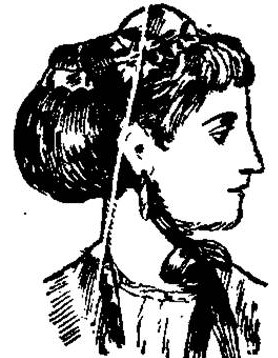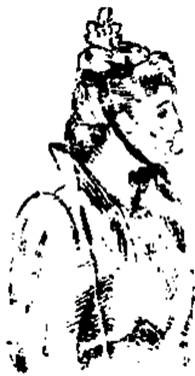This article has been transcribed from a copy of the Cardiff Times in the online collection of scanned Welsh newspapers 1804-1919 in the National Library of Wales, with grateful recognition of the free access accorded to all readers. Paragraph breaks have been introduced for easier reading.
Explanatory Notes
Samuel insults his Welsh readers (presumably unintentionally) by suggesting that they are not musically literate. They are at this date more widely accomplished as musical performers and listeners than their English equivalent.
The US slang 'dude' had been rapidly assimilated into British English in the 1880s.
'one of the compensating laws of nature': a glance at Ralph Waldo Emerson's 'Compensation' in his Essays, First Series (1841).
'the upper ten': in other words the 'upper ten thousand', meaning the ten thousand wealthiest people in New York.
Explanatory Notes on Music, Musicians, and Composers
'[T]he Bogie Man' at the Gaiety: 'The Bogie Man' was a popular number in Carmen up to data, [sic], a burlesque of Bizet's opera Carmen, and one of a series of burlesques mounted at the Gaiety Theatre by George Edwardes, who had taken over the Gaiety in 1886. 'a Joachim or a Sarasate':Joseph Joachim (1831-1907) and Pablo de Sarasate (1844-1908) were the two greatest violin virtuosi of the day.Georg Martin Adolf von Henselt (1814–1889), German composer and virtuoso pianist. 'Harradan' is perhaps Samuel Harradan, a musical instrument maker and importer. Molloy from Meyerbeer: James Lynam Molloy (1837–1909) was an Irish composer, poet, and author, best known for his popular songs, while Giacomo Myerbeer (1791-1864) was a prolific and highly successful operatic composer. —— David Skilton

here is nothing more peculiar in connection with human nature than the blind way in which it follows the decrees of the god of fashion. 'You might as well be out of your mind as out of the fashion' says an old adage, and there are people who carry it out to the fullest extent. No one knows, and, apparently no one cares, who sets the fashion, but they come and go and repeat themselves in a manner the like of which is only excelled by the repetitions of history. The clown who said he thought the height of absurdity was reached when a man tried to bolt a door with a boiled carrot, might have added a rider to the effect that fashion and its followers would run the perpetrator of the attempt he names a very close race.

1867.
No matter how absurd or how objectionable the decrees of fashion may be. there are people who deem it a sine qua non [essential commitment] to follow them. There is, however, to the thinking being some sort of satisfaction in the knowledge that they frequently work out their own punishment at the same time that they are indulging in their blind worship. This, I suppose, is one of the compensating laws of nature.
For instance, it is the fashion to 'adore' classical music, and all sorts and conditions of men and women are to be found at any classical concert promoted by a popular Entrepreneur.
They care, for the most part, as much about classical music as they do the most prosy sermon. In fact, the male portion of the patrons look upon the whole thing as a bore, and would far rather encore 'The Bogie Man' at the Gaiety than listen to the finest performance by a Joachim or a Sarasate. But still they go to the concerts. It is the fashion. Not only does fashion, particularly in this instance, produce dull ennui, but it produces, or induces, the pernicious habit of lying. Percy de Vere, whose only accurate knowledge refers to horses, tells the Honourable Nellie Beauchamp that he thinks Chopin 'awfully fine, don'tcher know,' and hazards the opinion that Sullivan is superior to Mendelssohn. He could not tell Henselt from Harraden, or Molloy from Meyerbeer.
In the matter of dress fashion is ever changing, and the clothes donned in the long ago would, were they not purloined and sold, come into fashion periodically. There is no originality in the matter of our clothes, and the 'latest fashion' is but an adaptation of some of the garments of our great-grandfathers. There is always some diffidence as to wearing the new thing for the first time, and the man who prides himself on being thoroughly up to date must endure a martyrdom of chaff and ridicule. Yet ere he has worn the last new thing a week it is copied and adopted by all the fellows in his set, and at once becomes the fashion. I have often been tempted to fancy that the up to date young man derives no small portion of his income from the. producers of some of the fashions he trots out.

1891.
When a fashionable thing becomes really popular, and is worn by the great of mass of people, it is at once discarded by the upper ten and a new style provided. The only fashion of recent years which never reached the masses (and it proved their sense) was the aesthetic one, beloved of Oscar Wilde and his cult.
There is no doubt that it was, in a measure, a picturesque costume, but its wearers did not go the right way even to make it the fashion with the classes, for they set it forth that if you wore the costume you must adopt the creeds and fads of the cult; you must attitudinise and 'flop' and be prepared to go into gushing ecsta[s]ies on every possible occasion. The aesthetes were conspicuous, but, though they had a following, they never were the fashion in the broad sense of the word.
It is told of a country American who saw an aesthetic 'dude' in New York for the first time that he remarked as he took in the figure and get-up, 'Great Scott! What strange things you dew see when you haven't got a gun.'

1867.
The dude was in the fashion, the countryman was not, and no doubt the dude's contempt for the countryman would only have been equalled by the countryman's contempt for him. There is no limit to the absurdity and snobbishness of fashion, as witness the following which I saw in a London paper the other day:--
'Society (writes a West-end correspondent) is greatly exercised over a new fashion in hand-shaking. A little while ago we had a curious contrivance in vogue which, whilst it resembled the ungainly movements of some rheumatic bird, failed to convey to the mind of the "ordinary person" the slightest idea of intelligibility. A spasmodic movement of the upper limbs succeeded the death of this fashion, which, in its turn, was superseded by one in which a convulsive and rather alarming contraction of the muscles of the hands was considered to be de rigueur [required by fashion]. I hear, by-the-bye, that hand-shaking is to go out of fashion altogether, and that the old form of salutation, the raising of the hand to the lips, will come into vogue with the commencement of the season.'

1891.
How ridiculous the whole thing is! As if the ordinary mode of shaking hands was not good enough for any sensible set of human beings. What is to become of the heavy grip of friendship which, between man and man, has ere this meant more than words, and which between man and woman has expressed more, genuine sympathy and devotion than could the whole of the English language.
Once let this fashion come in, and, in the name of all that is sentimental, what are the poor unfortunate hand-squeezing lovers to do? Shades of Eros! They will have to invent a new method of silent intimation or rise as one (not [… original illegible]
At the present day the vagaries of fashion are robbing us of our best qualities and are calculated to injure us as a race. In literature, in art, and in the drama there is a leaning to unhealthiness, most of which is the outcome of fashion and the craving for something new.
All this has a tendency to vitiate the mind, and make the rising generation look with the eye of scepticism upon the things their fathers revered, and worship the things their fathers would in their young days have considered 'without the pale.'
Links to Related Material on Fashion
- Samuel joins the Gay Throng
- Samuel on the Art of Dressing Well
- Samuel on Keeping Up Appearances
- Samuel on Hats and their Wearers
Links to Related Material on Wilde and Aestheticism
Last modified 24 April 2022